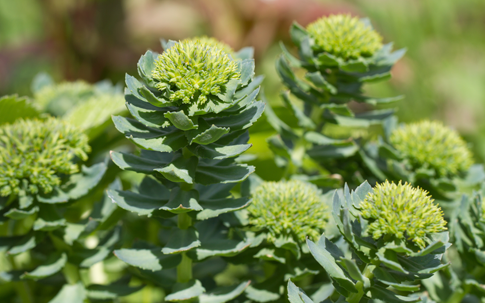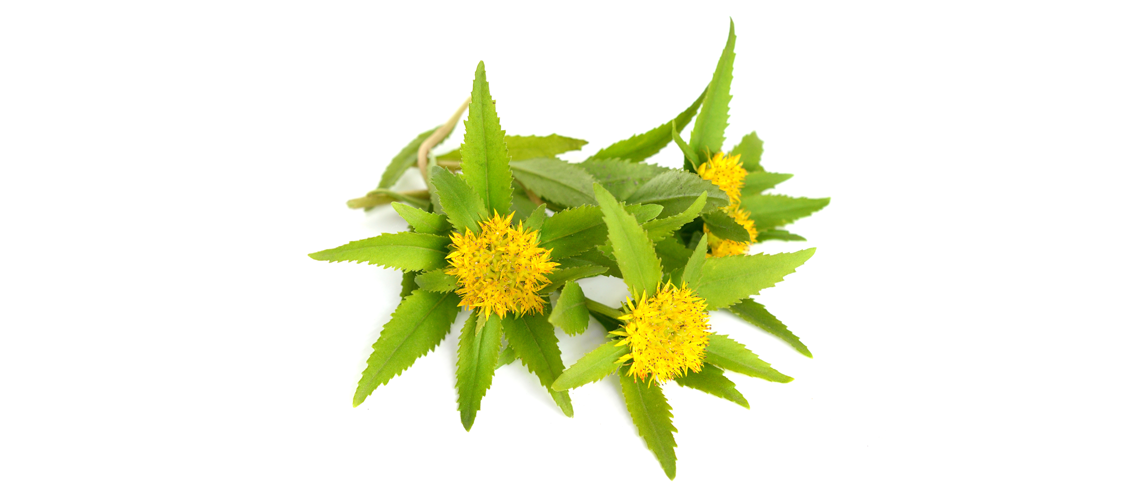Rhodiola (whose botanical name is Rhodiola rosea), is a plant that grows in cold and elevated regions of the Northern Hemisphere, which is also known by other suggestive names such as “polar rose”, “root of the arctic” or, “golden root”. The name rose refers to the rose fragrance of freshly cut underground organs (roots and rhizomes)
.
Its natural habitat is the wild arctic regions of Northern Europe, Asia and North America, and it can spread like a tapestry. It can also be found, although in smaller quantities, on the alpine floor of the highest mountains, including the Pyrenees.

This plant belongs to the crasulaceae, a family of plants that have in common having developed mechanisms that allow them to survive in extreme conditions. Its leaves grow in clusters and are succulent, that is, thick and fleshy, modified to be able to store more water than those of other plants. They are dioecious plants, meaning that there are male feet and female feet. The flowers of the male feet are yellow or orange, those of the female feet have a purple or dark maroon color
.
Traditional use and first scientific studies
The roots and rhizomes of this plant have been part of the traditional medicine of the countries where it grows, such as Russia or Scandinavia, where it has been used for multiple purposes, including improving physical performance, reducing fatigue, strengthening the individual and, ultimately, helping to better withstand the harsh climatic conditions to which the populations of these regions are subject.
The study of this plant and of many traditional Russian medicine plants, we could say, was driven by the so-called “cold war” that in 1947, faced the capitalist and communist blocs, led respectively by the United States and the then called Soviet Union. In order to improve the performance of its soldiers, the Soviet state commissioned a group of scientists to study the properties of different plants popularly known for their beneficial properties to increase the bodys defenses and improve peoples physical and mental performance.
This team, led by Dr. Lazarev, included among its researchers Dr. Israel Brechman, who extended the research to several plants, including Rhodiola rosea.
As a result of these studies, in 1969 it was included in the official Russian Pharmacopoeia, which recommended its use as a medicinal tonic. Already in those years, various medical and pharmacological texts recognized its properties to recover states of asthenia (tiredness, fatigue), improve resistance to work and infections, and improve attention and memory.
Current knowledge:
Rhodiola roots and rhizomes have a very complex chemical composition that has been elucidated over the years, thanks to research by various groups of researchers (such as the teams led by Doctors: Panossian, Ali and Tolonen). The main constituents are a group of substances included under the common name of rosarines (rosavine, rosine and rosarin) and salidroside (also called rhodioloside or tyrosol), which mark their quality and activity, since most
of the extracts used in clinical studies are standardized (quantified) in these substances.
The studies carried out have demonstrated the adaptogenic effect, understood as established in 1947 by the mentioned Russian scientist Dr. N.V. Lazarev, that is, as a substance or substances that increase the bodys resistance to stress and that today it is accepted that they have a general tonic, antioxidant, modulating the immune system and protecting the cardiovascular system, among others.

Thus, the multiple studies carried out with rhodiola extracts have confirmed their beneficial effects in situations of excessive physical (sports or physical work) or intellectual activity, by improving physical and mental performance, increasing work capacity, reducing the intensity of fatigue after intense physical exercise and reducing the recovery period. In clinical trials, it has been observed that it produces dose-dependent improvement in all the parameters studied: exhaustion, decreased motivation, drowsiness, decreased libido, sleep disorders and low intellectual performance. In 2011, the European Medicines Agency published a monograph in which, based on the evaluation report prepared by a group of experts, it accepts its use for the relief of symptoms of stress, such as fatigue and feelings of weakness
.
As far as the immune system is concerned, it has been observed that it stimulates one of the most important types of immune cells, NK cells (acronym that comes from the English “natural killer”) whose mission is to destroy infected cells in the body.
On the other hand, it also helps to improve the immune system indirectly by improving resistance to stress, since it is known that in stressful situations the body consumes more energy and causes a lower immune system response that results in a lower level of health
.
Other recent studies have demonstrated that rhodiola extracts have a beneficial effect in situations of low mood, early symptoms of depression and in states of anxiety, producing significant improvements in symptoms that can be measured according to the Hamilton scales for depression and anxiety (scientific scales used to measure these states).
The importance of quality
However, it should be noted that the biological activity of rhodiola root and rhizomes and its extracts depends on the quality of the materials, from the root to the finished product. A poor harvest, the cultivation of the plant at inappropriate times or regions, an inappropriate climate, the form of extraction and conservation may cause the above-mentioned active components (rosarines, salidroside and others) to not be found or are not found in sufficient quantities to exert their effects.
This is why it is especially necessary to ensure that the rhodiola-based food supplements that are going to be consumed have the highest quality right from the start. Only in this way, this root that comes from the cold will be able to help us overcome periods of stress or increased effort requirements, will strengthen our immune system and improve our mood, offering us a better quality
of life.
Prof.ª Mª José Alonso Osorio​​​​​​​​​​​​​​
- Licenciada en Farmacia por la Universidad de Barcelona.
- Diplomada en Fitoterapia por la Universidad de Montpellier.
- Especialista en Farmacia Galénica e Industrial.
- Director Técnico y responsable de desarrollo de productos en Industria Farmacéutica (1972 a 1985).
- Farmacéutica comunitaria (desde 1985 hasta 2004 como titular y copropietaria, desde 2010 como substituta a tiempo parcial).
- Profesora y tutora en Máster y Postgrado de Fitoterápia UB - IL3 (Universidad de Barcelona)
- Profesora colaboradora en Máster de Nutrición y Salud, UOC (Universitat Oberta de Catalunya)
- Vocal de la Junta de Gobierno de la Sociedad Española de Fitoterapia.
- Miembro del ComitĂ© CientĂfico de INFITO (Centro de InvestigaciĂłn sobre Fitoterapia).
- Socia de la AEEM (Asociación Española para el Estudio de la Menopausia)
- Académica correspondiente de la Real Academia de Farmacia de Cataluña.
All rights reserved ©. The reproduction, partial or total, of the content in any form is prohibited without the prior written consent of Cien Por Cien Natural SL. If you want to share the information, reproduction is allowed by citing Cien Por Cien Natural SL or using the link on their website. Cien Por Cien Natural SL is not responsible for misuse of the content of the article
.







